Speech development in children can vary significantly. While some children achieve clear pronunciation early on, others may require additional support. If you're concerned about your child's speech clarity, there are a number of simple tools and techniques you can incorporate at home to help them on their journey.
Understanding the Building Blocks of Speech
Speech clarity relies on a well-coordinated team: the tongue, lips, jaw, and vocal cords. When these parts work together seamlessly, the result is clear and articulate speech. However, weakness or incoordination in any of these areas can lead to difficulties forming certain sounds.
Targeted Exercises Can Make a Difference
There are a variety of exercises you can try at home to strengthen your child's oral motor skills and improve speech clarity. Here are some ideas:
- Tongue Exercises for Strength: Playful activities like licking peanut butter off the roof of the mouth or cheeks encourage tongue movement, which can benefit sounds like "t," "d," "n," and "l."
- Lip Exercises for Precision: Another tip involves lip rounding and stretching exercises. Blowing bubbles or simply making silly faces can improve lip control needed for sounds like "w," "ooo," and "eee."
- Straw Activities: Activities with straws can be a fun way to strengthen the oral muscles. Encourage your child to blow bubbles in a cup of water or sip their favorite drink through a straw.
Making Everyday Activities Speech Therapy Sessions
The good news is that you don't need a dedicated therapy session to help your child. Here's how to turn everyday activities into speech-boosting opportunities:
- Sing and Read Together: Singing and reading expose children to proper sound formation and sentence structure.Make it interactive by asking your child to imitate sounds or fill in the blanks in familiar rhymes.
- Playtime with a Purpose: Games like blowing bubbles, playing patty-cake, or simply making funny faces with your child can all be disguised speech therapy sessions. These activities promote oral motor skills in a fun and engaging way.
- Focus on Clear Pronunciation: When talking to your child, slow down your speech and enunciate clearly. This provides a good model for them to imitate.
Additional Resources: Low-Tech and High-Tech Solutions
For a wider range of exercises, you can consult resources like the American Speech-Language-Hearing Association (ASHA) or the National Institute on Deafness and Other Communication Disorders (NIDCD). These websites offer downloadable resources and helpful information.
The PCAM website provides a comprehensive list of low- and no-tech speech and language resources for home use.
Myofunctional Therapy: A More Specialized Approach
In some cases, a more targeted approach might be necessary. Myofunctional therapy focuses on retraining the oral and facial muscles for improved speech production. This type of therapy is often used to address conditions like tongue thrust and weak oral muscles.
The Spot Pal: A Tool for Myofunctional Therapy
One such tool used in myofunctional therapy is the Spot Pal. This small, biofeedback device helps strengthen the tongue and improve oral posture. By placing the Spot Pal on specific points on the tongue, children receive gentle vibrations that provide sensory feedback and guide them towards proper tongue placement.
When to Seek Professional Help
While there are many things you can do at home, it's important to know when to seek professional help. If your child is experiencing any of the following, a consultation with a speech-language pathologist (SLP) is recommended:
- Difficulty forming specific sounds by age 2
- Limited vocabulary by age 3
- Difficulty following simple directions
- Persistent frustration with communication
A speech-language pathologist can conduct a thorough evaluation and develop a personalized treatment plan to address your child's specific needs.
Explore Spot Pal, a custom-designed oral appliance that promotes proper tongue posture and eliminates sucking habits.

Share:
Does Your Child's Sleep Affect Their Focus?
5 ways to boost focus during a game